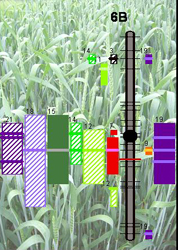Bread wheat with low fertiliser requirements
The application of nitrogen as a fertiliser has helped substantially increase crop yields, but it has also polluted and threatened the health of our ecosystems. Rothamsted Research, a leader in agricultural research in the United Kingdom, coordinated a project aiming to develop a strain of bread wheat more efficient at absorbing nitrogen. The scientists used genetic analysis to identify specific regions on the plant's chromosomes, known as loci, associated with the genes that drive nitrogen utilisation. The work was the first of its kind for bread wheat. They discovered that the enzyme glutamine synthetase (GS) plays a key role in the process. This finding was later confirmed by field trials. In addition, cooperation was established with complementary research efforts dedicated to Near isogenic line (NIL) production. Rothamsted Research and its partners will use Marker-assisted selection (MAS) to exploit the knowledge acquired during SUSTAIN to selectively breed bread wheat with high nitrogen utilisation. The procedure can also potentially be extended to identify and elicit other advantageous traits. Finally, other major food crops, such as maize and rice, are also prime candidates for similar studies. This will lead to further reductions in the application of artificial fertilisers and the negative impacts associated with this practice.



